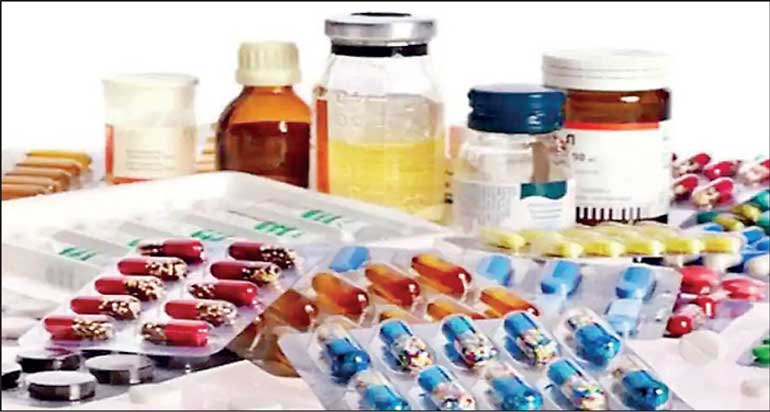Wednesday Feb 18, 2026
Wednesday Feb 18, 2026
Wednesday, 19 July 2023 00:05 - - {{hitsCtrl.values.hits}}

The use of poor quality medicines may have undesirable clinical and economic effects, as well as affect the credibility of the health delivery system
 By looking at the sequence of events in relation to the quality issues of the medicines in Sri Lanka in recent past, the patients and health workers are confused how long they will have to manage the current situation and how fast Sri Lanka as a country will be able to correct this situation and have a fool proof system of having safe, reliable and effective medicines in the public and private healthcare setup in the country.
By looking at the sequence of events in relation to the quality issues of the medicines in Sri Lanka in recent past, the patients and health workers are confused how long they will have to manage the current situation and how fast Sri Lanka as a country will be able to correct this situation and have a fool proof system of having safe, reliable and effective medicines in the public and private healthcare setup in the country.
An effective quality assurance mechanism of medicines in a country needs technical and managerial commitment. The purpose of quality assurance in the pharmaceutical supply system is to make sure that each medicine reaching patients is safe, reliable and effective. The quality of pharmaceutical products is ensured by the technical and managerial activities of the quality assurance mechanism of medicines in a county. It includes evaluating pharmaceutical product documentation, performing or reviewing quality control laboratory tests, and monitoring product performance, etc. The managerial activities include the selection of reliable suppliers, preparing an appropriate contract term, monitoring supplier performance, and performing inspection procedures of medicines throughout the distribution network.
The World Health Organization expects the Drug Regulatory Authority (DRA) of a country (National Medicines Regulatory Authority NMRA in Sri Lanka) to handle the following tasks.
1. Registration of medicines by evaluating and approving the product quality for market entry and post marketing surveillance
2. Regulation of manufacturing, importation, and distribution of local and foreign suppliers and quality of medicines in distribution
3. Regulation of medicine promotion and information including vigilance on the medicines in use and patient education.
By looking at the current lapses in the system, it is necessary to look at whether the required resources are available for NMRA to perform those activities effectively and efficiently. An experienced and highly qualified staff including robust administrative setup will be a key point in understanding the mandate and executing it as NMRA acts as the regulatory body of medicines in Sri Lanka.
The quality of a medicine can be defined and tested in many ways. The quality standards of medicines are published in pharmacopoeias and in some Government publications which provide testing methods. The major pharmaceutical manufacturing countries publish their own pharmacopoeias or on regional basis, the European Pharmacopoeia establishes standards that are enforced by the Governments of the European Union. The International Pharmacopoeia is published by the WHO. Sri Lanka follows the U.S. Pharmacopeia and the British Pharmacopoeia.
Quality medicines
The quality of a medicine which is coming off the production line is determined by the start-up materials, factory environment, manufacturing equipment, and technical know-how invested in developing and manufacturing the medicines. The medicine that ultimately reaches the patient is further affected by packaging, transportation and the storage conditions.
The dynamic nature of medicines and the cumulative effects of the production process, right through to packaging, handling, transport, and storage conditions, require quality assurance at all levels in the medicinal supply chain.
NMRA shall assure that all medicines in the country shall comply with the pharmacopoeia standards in relation to the identity, purity, strength, potency, uniformity of the dosage form, bioavailability, and stability.
Poor-quality medicines
Poor-quality medicines are substances which do not meet the specifications of the Pharmacopoeia. The use of poor quality medicines may have undesirable clinical and economic effects, as well as affect the credibility of the health delivery system. The adverse clinical effects can include prolonged illness or adverse reactions or death. On the economic side, the limited financial resources of a country may be wasted on poor-quality medicines. Sri Lanka is currently experiencing these adverse circumstances.
Practical approach for assuring the quality of medicines in Sri Lanka
The procedures to ensure that all medicines in the country are safe, reliable and effective can be achieved by a 3-step process as explained below.
1. Procedures to ensure that only medicine products that meet pharmacopoeia standards are available in the market.
a. Careful product selection
b. Careful supplier selection
c. Certificate of analysis for each batch of product
d. Certification of good manufacturing practices
e. Batch certification (WHO-type certificate for each medicine)
f. Inclusion of detailed product-quality specifications in the procurement contracts and penalty for lapses
2. Procedures to verify that the shipped goods meet the specifications.
a. Pre- and post-shipment inspection of all medicines
b. Analytical pharmaceutical testing (batch wise for each product)
3. Procedures to monitor and maintain the quality of pharmaceuticals from the moment
they are received until the medicine is finally consumed by the patient.
a. Proper storage and distribution procedures
b. Appropriate dispensing
c. Instructions to the patient on proper use of medicines
d. Product defect and pharmaco vigilance reporting programs.
e. NMRA and Government procurement process of medicines
NMRA and the Government procurement arm of medicines namely State Pharmaceuticals
Corporation (SPC) and Medical Supplies Division (MSD) should work together effectively and should have integrated information systems vice-versa. As NMRA exists, the Government shall restrict the medicines which are registered by NMRA. NMRA shall assure that medicines are registered and freely sold once they are rigorously evaluated for safety, reliability and efficacy.
Medicines which are available in the country should be the best as Sri Lanka uses its hard-earned money for procuring them and managing one of the best healthcare setups in the world. It further assists to boost the confidence of patients, health workers and other stakeholders in the healthcare system.
(The writer is a pharmacist by profession. He functioned as CEO of hospitals and medical lab chains for decades. He had worked in state healthcare institutes too. Having obtained academic qualifications of Diploma in Pharmacy, Bachelor of Pharmacy, post graduate Diploma in Business Management, MBA, Certified Management Accountant and PhD, he is reading for his postdoctoral fellowship on health economics at present.)